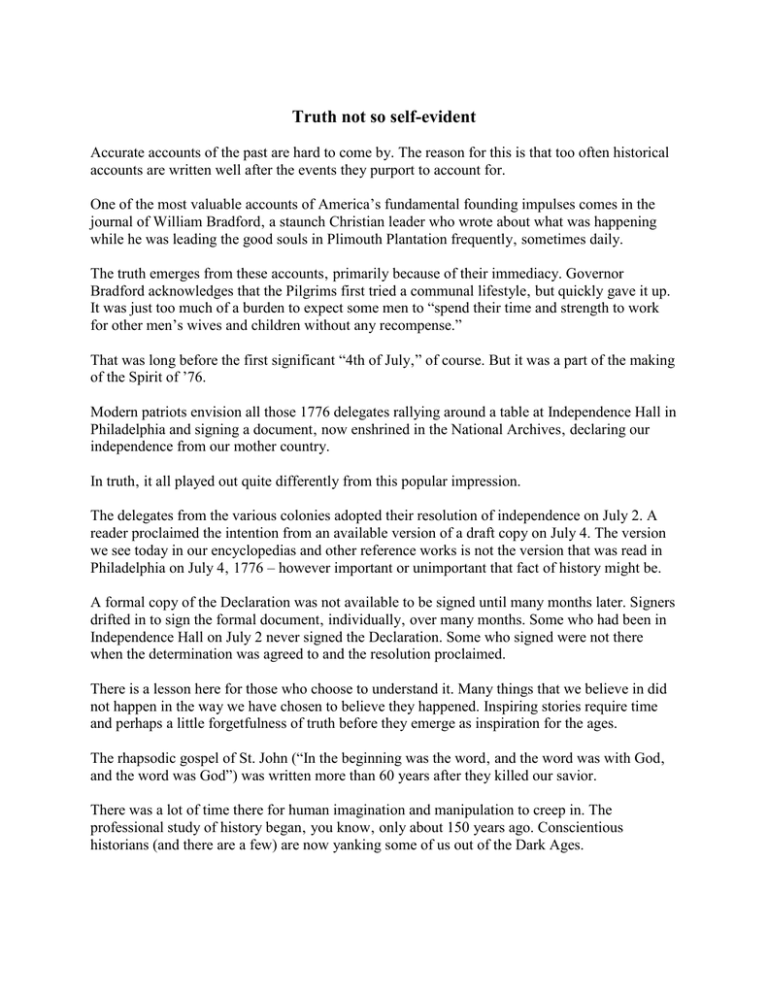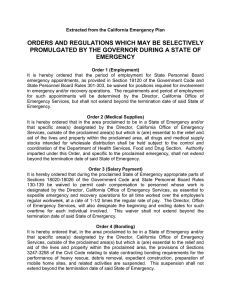Truth not so self-evident
advertisement

Truth not so self-evident Accurate accounts of the past are hard to come by. The reason for this is that too often historical accounts are written well after the events they purport to account for. One of the most valuable accounts of America’s fundamental founding impulses comes in the journal of William Bradford‚ a staunch Christian leader who wrote about what was happening while he was leading the good souls in Plimouth Plantation frequently‚ sometimes daily. The truth emerges from these accounts‚ primarily because of their immediacy. Governor Bradford acknowledges that the Pilgrims first tried a communal lifestyle‚ but quickly gave it up. It was just too much of a burden to expect some men to “spend their time and strength to work for other men’s wives and children without any recompense.” That was long before the first significant “4th of July‚” of course. But it was a part of the making of the Spirit of ’76. Modern patriots envision all those 1776 delegates rallying around a table at Independence Hall in Philadelphia and signing a document‚ now enshrined in the National Archives‚ declaring our independence from our mother country. In truth‚ it all played out quite differently from this popular impression. The delegates from the various colonies adopted their resolution of independence on July 2. A reader proclaimed the intention from an available version of a draft copy on July 4. The version we see today in our encyclopedias and other reference works is not the version that was read in Philadelphia on July 4‚ 1776 – however important or unimportant that fact of history might be. A formal copy of the Declaration was not available to be signed until many months later. Signers drifted in to sign the formal document‚ individually‚ over many months. Some who had been in Independence Hall on July 2 never signed the Declaration. Some who signed were not there when the determination was agreed to and the resolution proclaimed. There is a lesson here for those who choose to understand it. Many things that we believe in did not happen in the way we have chosen to believe they happened. Inspiring stories require time and perhaps a little forgetfulness of truth before they emerge as inspiration for the ages. The rhapsodic gospel of St. John (“In the beginning was the word‚ and the word was with God‚ and the word was God”) was written more than 60 years after they killed our savior. There was a lot of time there for human imagination and manipulation to creep in. The professional study of history began‚ you know‚ only about 150 years ago. Conscientious historians (and there are a few) are now yanking some of us out of the Dark Ages. There are those among us‚ though‚ whose incomes and influence depend on perpetuating the myths. And those people will always be with us. We must live with them and be kind to them. The older I get‚ though‚ and the more I have the opportunity to think‚ the more I value the deistic words of those two Tom boys: Paine and Jefferson: “We hold these truths to be self evident‚ that all men are created equal‚ that they are endowed by their creator with certain inalienable rights‚ that among these are life‚ liberty and the pursuit of happiness.” What to do now? Well‚ the past is never more important than the present. I believe that the challenge today‚ at least for those of us who shared important values and expressed faith in each other many years ago‚ is now to keep the faith that led us to each other and sustains our continuing efforts to do the good as we see it each and every day. (James P. Cooney of Woxall is a professor at Montgomery County Community College.) Published: The Reporter, Lansdale, July 04, 2003.





